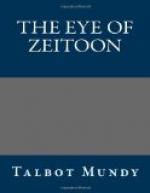All, things considered, I might have done worse than decide to say no more about the plot, but to keep my own eyes wide open. (I was particularly sore with Gloria, and derived much unwise consolation from considering stinging remarks I would make to her when the actual truth should out.)
Monty began making the best of my, in his eyes, damaged character by explaining the general dispositions he and Kagig had made for the defense of Zeitoon.
“According to my view of it,” he said, “this bridge we’ve just crossed is the weakest point—or was. I think we can hold that clay ramp you came up yesterday against all comers. But there’s a way round the back of this mountain that leads to the dismantled fort you see on this side of the river. That is the fort built by the Turkish soldiers whom Kagig told us the women of Zeitoon threw one by one over the bridge.”
He stopped (we had climbed about two hundred feet of a fairly steep track leading up the flank of Beirut Dagh) and let the others gather around us.
“You see, if the enemy can once establish a footing on this hill, they’ll then command the whole of Zeitoon opposite with rifle fire, even if they don’t succeed in bringing artillery round the mountain.”
Between us and Zeitoon there now lay a deep, sheer-sided gash, down at the bottom of which the Jihun brawled and boiled. I did not envy any army faced with the task of crossing it, even supposing the bridge should not be destroyed. But they would not need to cross in order to make the town untenable.
“The Zeitoonli are, you might say, superstitious about that bridge,” Monty went on. “They refuse as much as to consider making arrangements to blow it up in case of need. Another remarkable thing is that the women claim the bridge defense as their privilege. That doesn’t matter. They look like a crowd of last-ditch fighters, and we’re awfully short of men. But we’re almost equally short of ammunition; and if it ever gets to the point where we’re driven in so that we have to hold that bridge, we shall be doling out cartridges one by one to the best shots! I have tried to persuade the women to leave the bridge until there’s need of defending it, and to lend us a hand elsewhere meanwhile; but they’ve always held the bridge, and they propose to do the same again. Even Kagig can’t shift them, although the women have been his chief supporters all along.”
Fred interrupted, pointing toward a few acres of level land to our left, below Zeitoon village but still considerably above the river level.
“Is that Rustum Khan?”
“He it is,” said Kagig. “A devil of a man—a wonder of a devil—no friend of mine, yet I shook hands with him and I salute him! A genius! A cavalryman born. Our people are not cavalrymen. No place for horses, this. Yet, as you have seen, there are some of us who can ride, and that Rustum Khan found many others—refugees from this and that place. See how he drills them yonder—see! It was the gift of God that so many horses fell into our hands. Some of the refugees brought horses along for food. Instead, Rustum Khan took men’s corn away, to feed the hungry horses!”




